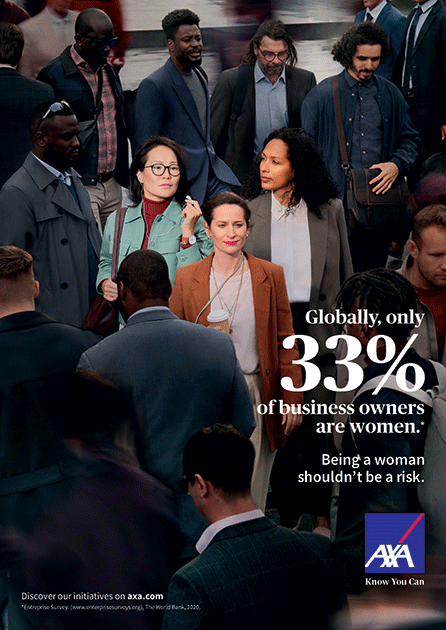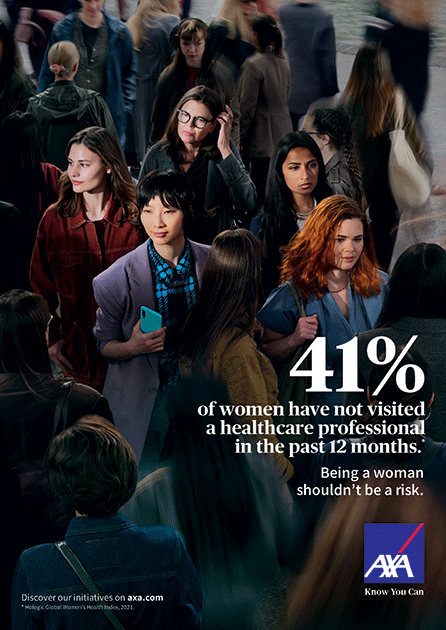Insurer AXA Exposes the Risks of Being a Woman That Its Industry Has Long Ignored
Don’t miss Brandweek, Adweek’s ultimate experience for marketers, September 11-14 in Miami. Connect with peers and gain insights and inspiration from top brand marketers and industry icons at Glossier, Coca-Cola, Taco Bell and more. Register.
Being a woman comes with a certain amount of risk. Historically, insurance companies considered gender a risk factor before laws in the European Union and some U.S. states prohibited providers from factoring in gender when setting premiums.
But disparities remain, with some studies showing that women are less likely to have coverage or pay more for life or health insurance. “The fact is that women are both overexposed to certain risks and under-protected,” said Ulrike Decoene, head of communication, brand and corporate responsibility at global insurance company AXA Group.
AXA’s new campaign highlights the disproportionate risks faced by women across health, business, education and sports. The brand’s message is: “Being a woman shouldn’t be a risk.”
Each of the ads, created by agency Publicis Conseil, highlights a stark statistic. Globally, only 33% of business owners are women; 36% of women don’t exercise enough to stay healthy; and 41% of women have not visited a healthcare professional in the past 12 months.
AXA says it wants to raise awareness of these disparities and push for change.
“As an industry, we can serve the purpose of empowering and strengthening women’s position in society,” Decoene told Adweek. “Despite all the progress made for women, there are still issues they face that are less supported. We have a role to play, but everyone should as well.”
A delicate balance
AXA’s film depicts how women are exposed to various risks throughout their lives, from a teenage girl scrolling through unrealistic images of models on social media, to a woman examining bruises on her neck and leaving the house where she’s been abused, to another woman giving birth.
Decoene said the brand’s aim was to show a nuanced portrayal of women’s experiences while avoiding stereotypes.
“We wanted to strike a balance where we showcased their risks and vulnerabilities without putting women in the victim position,” she said. “But we didn’t want to fall into the opposite either, of showing women as superheroes.”
Madeline Clayton directed the film. The soundtrack is a slowed-down cover of Cyndi Lauper’s 1983 hit song “Girls Just Want to Have Fun,” rerecorded by artist Buzzy Lee—adding a light touch to a serious subject matter, Decoene explained.
“We had to tackle topics like unconscious bias and domestic violence without losing the tone we wanted, which is hopeful, optimistic and gives everyone energy,” she added.
Taking action
As brand campaigns about gender equality tend to be closely scrutinized, AXA insists that its marketing is backed up with concrete action throughout its business.
For example, in health, it has developed products specifically geared at women’s issues, such as coverage for breast cancer patients and free teleconsultation services to provide medical attention digitally. In sports, it sponsors women’s teams Liverpool Women’s FC in the U.K. and the AXA Women’s Super League, Switzerland’s main women’s soccer league. Since female entrepreneurs tend to have less access to funding, AXA has advisors who support female business leaders and offers customized coverage for small businesses.

As of 2024, AXA will also introduce a domestic abuse policy and support hub, offering up to five days of paid leave for employees who are experiencing domestic abuse to make arrangements.
It’s an uncertain environment, but it shouldn’t lead us to be fatalistic and paralyzed.
Ulrike Decoene
Internally, AXA said it is addressing gender parity through initiatives such as inclusive recruitment guidelines and leadership training for women. Across the global group, 41% of its CEOs are women–including newly appointed U.K. and Ireland CEO Tara Foley–and 41% of its group leadership network (GLN, comprising its top 250 executives) are women. It claims it has closed the unjustified pay gaps among the GLN. In 2017 it also launched a global parental leave policy, offering the primary parent fully paid leave of 16 weeks and the co-parent paid leave of four weeks.
Its campaign came about because “we also wanted to bring [these efforts towards gender equality] to women outside of the company–our customers,” said Decoene. “This is a call to action that goes well beyond our clients and employees.”
Changing an image
AXA’s message is just as much aimed at the industry it operates in. The financial services sector is known for being male-dominated.
Though Decoene said “there has been massive progress in recent years” in closing the industry’s gender gap, there is still work to be done in attracting more women to the field.
“The future of gender equality in financial services will depend on training choices starting early on. How do we get more women interested in the sector as a start?” she said. “Hopefully, our campaign’s message can help give a different image of what insurance companies could think about, or maybe inspire more women to join the sector.”

Inclusive insurance
AXA’s ads continue its “Know You Can” brand positioning launched in 2019, enlisting ambassadors such as tennis star Serena Williams. With the tagline, “Why should the future be a risk?” the platform will go on to champion progress among other underrepresented groups.
Over the next three years, its initiatives will support more “underprotected” populations, such as the elderly. AXA is also developing “inclusive” and affordable insurance policies for people with lower incomes–a need that has spiked amid the cost-of-living crisis, Decoene said.
It will also address new societal risks, such as the impact of climate change and cybercrime.
Despite these looming anxieties, Decoene said AXA does not want to scare people with its campaigning.
“It’s an uncertain environment, but it shouldn’t lead us to be fatalistic and paralyzed,” she said. “There are solutions out there. We are part of that and can contribute.”
CREDITS:
Group Head of Communication, Brand & Corporate Responsibility: Ulrike Decoene
Global Brand Director: Virginie Berçot
Brand Expert: Ida De Catuelan
Global Brand Project Officer: Emma Oumeddour
Media, Performance & Insights Director: Jêrôme Amouyal
Global Media Manager: Marine Gissy
Agency: Publicis Conseil
President Overseeing Creativity: Marco Venturelli
Global Executive Creative Director: Steve O’Leary
Art Directors: Laura Aondio, Alexadre Perdereau, Lucie Puybonnieux
Copywriter: Francesca Vitello
Production: Armelle Sudron, Prodigious
Production House: Grand Bazar
Diretor: Madeline Clayton
DOP: Thimios Bakatakis
Executive Producer: Gaetan Le Goff
Line Producers: Noemi March, Léa Villain Barachet
Production Coordinator: Amélie Zibi
https://www.adweek.com/brand-marketing/insurer-axa-exposes-the-risks-of-being-a-woman-that-its-industry-has-long-ignored/

